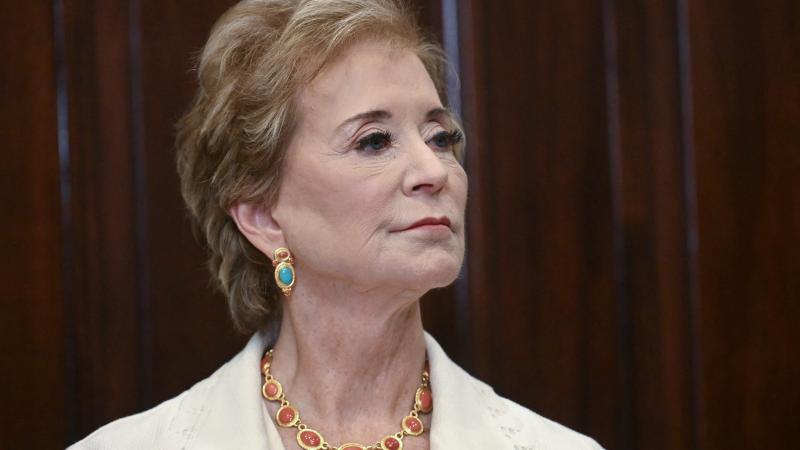Combative Trump pivots to new media strategy to counter negative coronavirus coverage
Social media and conservative outlets give the president a platform for more assertive tone.
President Trump’s unusual coronavirus press briefing Monday included what appears to be an unprecedented video presentation: a three-and-a-half-minute montage of news clips defending the president’s coronavirus actions.
The video was promptly dismissed on CNN as “propaganda” and “disinformation” on MSNBC, with both networks breaking away from the livestream so they wouldn’t air it live.
When asked afterward why he felt the need to show a video to promote his administration, Trump told White House reporters, "Because we’re getting fake news, and I like to have it corrected."
Monday’s montage appears to be part of a more comprehensive strategy for the president’s communication team to more aggressively counter negative media narratives.
Last month, Trump said at a coronavirus media briefing he was frustrated by the media coverage of the administration's handling of the coronavirus and said this was in part due to his own administration. Since then, the outlines of a more combative, new media strategy have emerged through a series of administration actions:
- challenging Voice of America for echoing the Chinese Communist Party line
- completely restaffing the White House communications team (including firing then-press secretary Stephanie Grisham)
- legally challenging the White House Correspondents' Association's control of the White House briefing room
- suing a Wisconsin television station for a "defamatory" ad
- quickly pivoting to a digital TV system for "virtual" rallies to replace the mass gatherings ruled out by social distancing guidelines
During two separate coronavirus briefings, Trump also questioned credentialed journalists in the White House briefing for their possible ties to the government of China.
Monday's White House video montage included medical analysts on news networks saying in January that the coronavirus did not pose a grave risk to the United States. It also included reports about Trump banning travelers from China in January with an audio clip from New York Times reporter Maggie Haberman, who said the travel ban was "probably effective." Other clips showed the president declaring a national emergency and Democratic governors thanking the president for offering federal assistance to states.
“I think I’ve educated a lot of people as to the press,” Trump said Monday. “I would love to be able to say that we have a very honest press. There’d be nothing I would be more proud of if the press would work. And I don’t mind being criticized, but not when they’re wrong. Not when people have done a great job.”
Daniel Okrent, a media veteran who also served as the New York Times’ first ombudsman, told Just the News he found Trump’s media strategy troubling.
“I have to say the president’s demonization of the media, especially calling the media as a group a ‘public enemy,’ is one of the most dangerous things I have ever seen a president do,” Okrent said. “It’s harmful to democracy, and it puts individuals at risk of physical harm. Presidents have had complaints about media coverage since the republic was founded. Most followed one of three approaches: Ignore it, because they are confident that the citizenry can distinguish partisanship from honest reporting; rebut it with facts; or open a campaign of warfare against media critics. That’s what Nixon tried, to a degree, and it backfired terribly.”
Okrent believes Trump’s aggressive press conferences fail to project strength. “The way President Trump deploys his slash and burn tactics aimed at anyone who criticizes him suggests, to me, a desperate man who has no fact base to retreat to — or, perhaps, a child on a playground, whining because he didn’t get his way,” he said.
Trump supporters and Republicans have deep distrust of the national media. Harvard University Kennedy School of Government professor of government and the press Tom Patterson's research showed at least 80% of mainstream media coverage of Trump was negative during his first 100 days in office, what Patterson called an unprecedented figure. On Monday, the White House cited a recent poll by Gallup finding 55% of Americans disapprove of the media’s coronavirus coverage and only 38% disapproving of the president's handling of the coronavirus.
David Bossie, president of Citizens United and deputy campaign manager for Trump’s 2016 campaign, told Just the News that the president is rightly frustrated with coronavirus coverage.
“Since the day the president announced his candidacy for president, the biased liberal media decided they were going to try to destroy him,” Bossie said. “There's always been bias in the media, but Trump has really exposed it. The liberal media's hatred for the president has exposed the fact that so many of these so called journalists are political activists who work for media corporations that are closer to Democrat Super PACs. I'm glad the President has upped his criticism of the press.”
In addition to threatening to defund VOA, Bossie said Trump should also push to defund NPR and the Corporation for Public Broadcasting.
“There's very little objectivity, and that's the ultimate failure of the media,” Bossie said. “The liberal media despises Trump because he's winning. They tried to destroy him in 2016, and they lost. They tried to destroy him with Russia and lost. They tried to destroy him with impeachment and lost. Now it's coronavirus, and they will lose again.”
Bossie said even though Nixon took a combative approach toward the media as well, Trump is more effective, in part because of better tools at his disposal.
“The media made Nixon their public enemy, but it was a different era with no social media or conservative outlets, so there was no place to go,” Bossie said. “When Trump is taking on the media at his press conferences, he's taking on political activists, not journalists. That's what Nixon should have done.”
Historian Jason Steinhauer, director of Lepage Center for History in the Public Interest at Villanova University, told Just the News that American presidents have continually negotiated complex relationships with the press.
“Lincoln, McKinley, Roosevelt, Eisenhower, JFK, Nixon, and Obama each, before President Trump, attempted to strategically cultivate and manipulate relationships with newspapers, radio, television and social media in order to sway public opinion and implement policies,” Steinhauer said.
Steinhauer said historians in recent years have traced the antagonism of the U.S. conservative movement toward the national media dating back to the middle of the 20th century, with conservative activists arguing for decades that national media outlets have inherent biases in their organizations, and that the viewpoints and philosophies of American conservatism have been excluded from national coverage.
“Whether or not this claim is true, more important is to recognize that, at heart, these are struggles over power: the power to set the agenda, the power to dictate the terms of the conversation, the power to grab and hold audience attention, and the power to win elections and determine the future direction of the country,” Steinhauer said. “Such contests over power have been features of American democracy for more than 100 years.
The Facts Inside Our Reporter's Notebook
Links
- Fox News Channel on reaction to Trump video
- MSNBC denunciation of White House "disinformation"
- JTN on White House blasting VOA for echoing Chinese propaganda
- JTN on White House communications shake-up
- JTN on contest for control of WH press room access
- JTN on Trump campaign suing Wisconsin TV station
- JTN on Trump campaign pivot to "virtual" rallies
- Washington Examiner on Trump challenging Hong Kong-based reporter in briefing
- Tom Patterson research
- March 25 Gallup poll on coronavirus responses















